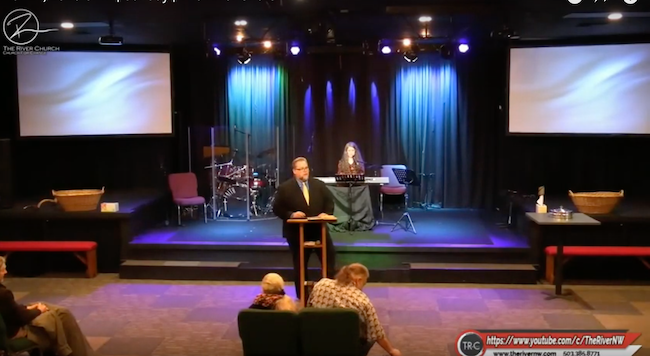 In this screenshot from a March 29, 2020 service, Pastor Lew Wootan preaches at The River to a more socially distant congregation.
In this screenshot from a March 29, 2020 service, Pastor Lew Wootan preaches at The River to a more socially distant congregation.
NOTE: Salem Reporter is providing free access to its content related to the coronavirus as a community service. Subscriptions help support this.
As churches, synagogues and houses of worship around Salem have switched to live streaming services, drive-by communion and prayer groups via Zoom, one Salem congregation has bucked the trend.
The River, a nondenominational church on Northeast Portland Road, held four smaller in-person services last Sunday, prompting concern from some parishioners.
Lin Johnson, 77, began attending The River in late 2019 with his stepdaughter and said he appreciated the energy and passion at services.
“They’re kind of a very exuberant church, a Holy Roller church,” he said. That means handshakes, hugs and physical closeness during services was common, he said.
But what was a source of comfort and support during normal times caused concern as the coronavirus spread and services continued as normal.
“I felt like they weren’t doing enough quickly enough to pull back on it,” Johnson said. He stopped attending in early March, concerned for his health. His stepdaughter shared those concerns, he said.
Lead Pastor Lew Wootan posted a video to the church website in mid-March explaining his decision to continue open services and detailing the social distancing measures he and other worship leaders are observing.
Those include “cleaning and sanitizing before, during and after services,” according to the church website, limiting the number of parishioners in one room at any service to 20, offering four services so those wishing to come in person can be part of a smaller group.
Services are also being live streamed, and the church website advises: “We care greatly about your well-being, if you are sick, elderly, or have a compromised immune system, we encourage you to stay home, to seek the Lord and to be wise.”
“Now is not the time to criticize how people are having their services,” Wootan said in the video. He said he had prayed about the decision and believed other pastors making different choices for their congregations had done the same.
“In a global time of crisis, we expect and rely on multiple people in essential positions around the world to be available to meet the needs of the people 24/7. We believe The Church is one of those essential roles,” the website reads.
Reached by phone Wednesday, Wootan spoke with a reporter for several minutes but said he didn’t want to answer any questions on the record about how services were being run or make any statement aside from what the church has already posted publicly, because of the “negativity” he’s received for keeping the doors open.
“There’s already a lot of tension in people’s lives. I don’t want to add any more doing an interview right now,” he said.
On its website, The River emphasizes being open to all, with a large ministry serving people recovering from addiction, and a bus ministry that transports people to services. It’s been incorporated since 1962, according to filings with the Secretary of State.
A live stream of one of The River’s March 29 services shows Wootan and other church pastors preaching as people sat apart, until the end of the service, when several approach him for hugs and handshakes.
As nearly all U.S. states have banned large gatherings, some pastors have continued to open their doors for much larger services.
Tampa megachurch pastor Rodney Howard-Browne was arrested this week after holding two large Sunday services with people standing shoulder-to-shoulder, the Tampa Bay Times reported. The size of the gatherings violated a county social distancing order. Howard-Browne later said he’d received death threats for holding services.
In France, at least 10 confirmed cases of COVID-19 have been tied back to a 2,000 person Lent service.
By limiting services to 20 people in one room, The River is within the size limits of Gov. Kate Brown’s March 17 executive order banning gatherings of more than 25 people in Oregon, though both Brown and President Donald Trump have recommended Americans limit gatherings to fewer than 10 people.
In a March 23 order, Brown also banned “non-essential social and recreational gatherings” where six feet of distance between people could not be maintained and mandated the closure of some businesses, like art museums and playgrounds, where it’s difficult for people to remain spread out.
Nothing in the order specifically addressed religious services, but most houses of worship in Salem have voluntarily moved to online or remote offerings, some at the direction of denominational leaders.
Local law enforcement officers are charged with enforcement, and in Salem, they’ve said they’ll take an “educational approach” rather than citing violators. Sgt. Jeremy Landers, spokesman for the Marion County Sheriff’s Office, said the office hasn’t received any complaints about The River that he’s aware of.
He acknowledged the balance between following social distancing orders and providing mental and emotional support to people struggling can be difficult.
“It’s a really hard balance for a whole lot of places that rely on the stability that different treatment providers and churches provide,” he said.
In general, Landers said violations of the order haven’t been a large law enforcement problem. Most people are opting to talk to their neighbors or complain on public forums like Facebook rather than calling police.
Contact reporter Rachel Alexander at [email protected] or 503-575-1241.

Rachel Alexander is Salem Reporter’s managing editor. She joined Salem Reporter when it was founded in 2018 and covers city news, education, nonprofits and a little bit of everything else. She’s been a journalist in Oregon and Washington for a decade. Outside of work, she’s a skater and board member with Salem’s Cherry City Roller Derby and can often be found with her nose buried in a book.









